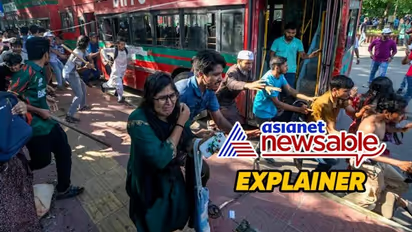Explained: Why Bangladesh's universities are shut indefinitely amid student protests

Synopsis
The protest began after the Bangladesh High Court on June 5 issued a ruling to restore the quota for freedom fighters and their families to 30% for government posts. This quota had however been abolished in 2018 following students and teachers' pressure and protest.
Dhaka – The Bangladesh government has announced all the universities namely public as well as private to remain shut from Wednesday (July 17) in response to protests against a quota system in government employment. Protests, which have ensued have led to at least six people's death and over 400 injured.
The trigger for the protests:
The protest began after the Bangladesh High Court on June 5 issued a ruling to restore the quota for freedom fighters and their families to 30% for government posts. This quota had however been abolished in 2018 following students and teachers' pressure and protest. The recent ruling revived the issue thus causing massive demonstrations in different parts of the country.
Bangladesh Prime Minister Sheikh Hasina crossed a line by calling the protesting people 'razakars' term used to describe traitors. This comment escalated the ire of the demonstrators and preceded to make the atmosphere even more tense.
Gujarat: Chandipura virus claims life of 4-year-old; 14 more deaths suspected due to virus
Understanding the quota system:
The essence of government jobs in Bangladesh is well understood by knowing the fact that throughout the country the government jobs are much sought after more as they are assured and better paid jobs. Every year, over 4 lakh graduates are in the fray for about nearly 3,000 jobs that are provided by the government. In 2018, 56% of these jobs were reserved for various categories:
- 30% for family members of 1971 liberation war veterans.
- 10% for women.
- 10% for residents of underdeveloped districts.
- 5% for tribal communities.
- 1% for persons with disabilities.
This left only 44% of the positions open for merit-based candidates thereby developing stringent search for jobs among the people. In particular, the freedom fighters' quota was seen as favoring those loyal to the ruling Awami League, adding to the frustration.
Historical protests and quota repeal:
In April 2018, students and teachers staged a four-month-long protest demanding the removal of these quotas and a reduction in overall reservation to 10%. The protests turned violent, involving clashes with the Bangladesh Chhatra League (BCL) and the police. Following international attention, PM Hasina announced the removal of all quotas.
Renewed protests and violence:
The June 2024 High Court decision to reinstate the freedom fighters' quota led to fresh protests, which intensified after Eid-ul-Adha celebrations on June 17. A nationwide Bangla Bandh was declared on July 7, despite the Supreme Court's Appellate Division staying the order's implementation for a month.
Protestors are now demanding the complete removal of discriminatory quotas, limiting reservations to 5% for constitutionally recognized backward populations, and enacting a parliamentary bill to secure these changes. This effectively calls for the elimination of the quota for freedom fighters' families while retaining benefits for the disabled and tribal communities.
Government response and international reaction:
It can be seen that the violence erupted on Monday as anti-quota protestors clashed with BCL members and police at various universities. The clashes resulted in six deaths, including three students, prompting the government to close all educational institutions indefinitely.
The higher secondary certificate exam that was scheduled for today (July 18) has been cancelled, and the Border Guard has been deployed in multiple locations.
In response to the escalating violence, Stéphane Dujarric, spokesperson for the United Nations Secretary-General, urged the Bangladesh government to seek a peaceful resolution and respect the protestors' right to peaceful demonstration.
Check the Breaking News Today and Latest News from across India and around the world. Stay updated with the latest World News and global developments from politics to economy and current affairs. Get in-depth coverage of China News, Europe News, Pakistan News, and South Asia News, along with top headlines from the UK and US. Follow expert analysis, international trends, and breaking updates from around the globe. Download the Asianet News Official App from the Android Play Store and iPhone App Store for accurate and timely news updates anytime, anywhere.